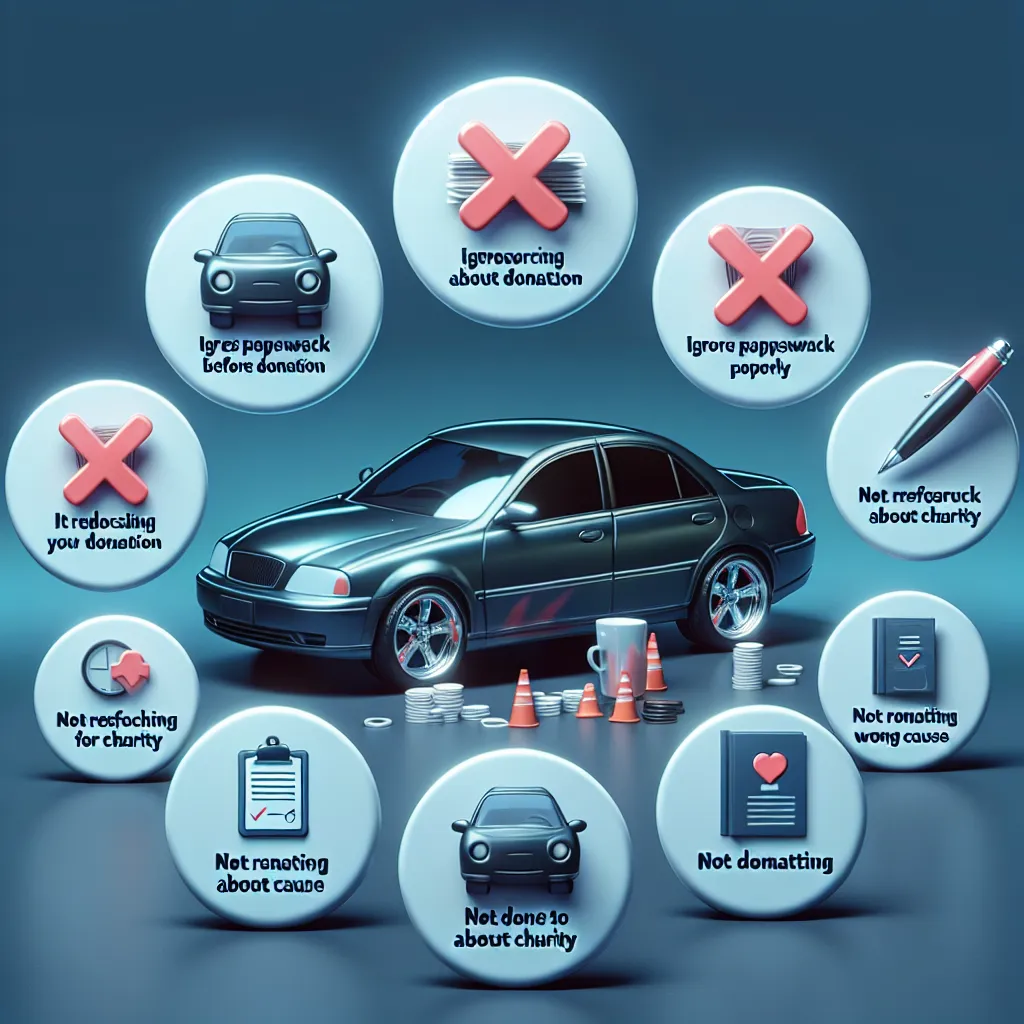Donating your car can be a generous and impactful way to support a cause you care about, but it's important to avoid common mistakes that can undermine your good intentions.
Avoiding Fake Charities in Car Donations
One of the most significant mistakes budget-conscious individuals can make when donating their car is falling victim to fake charities. These fraudulent organizations prey on the generosity of donors, diverting funds away from legitimate causes. To avoid this, it's essential to conduct thorough research before making a donation.
Start by verifying the charity's registration and tax-exempt status. Legitimate charities are registered with the IRS and have a 501(c)(3) status, which allows your donation to be tax-deductible. You can check the IRS website or use tools like Charity Navigator or GuideStar to verify the charity's credentials.
Additionally, look for reviews and complaints about the charity online. Websites like the Better Business Bureau (BBB) and consumer protection agencies can provide valuable insights into the charity's reputation. If you come across any red flags, such as unresolved complaints or negative reviews, consider choosing a different organization.
Be cautious of unsolicited fundraising calls and emails. Scammers often use these methods to solicit donations. If you receive a call or email asking for a car donation, take the time to verify the legitimacy of the request before proceeding. Never provide personal or financial information over the phone or through email unless you are certain of the recipient's identity.
"Always ensure that the charity you choose is transparent about its financials and how it uses donations. Legitimate charities will be open about their operations and provide detailed information about their programs and impact."
Choosing the Right Car Donation Program for Your Budget
Selecting the right car donation program is crucial for budget-conscious individuals. Not all programs are created equal, and some may offer better benefits or align more closely with your values. Here are some factors to consider when choosing a car donation program:
1. Ease of the Donation Process: Look for programs that offer a straightforward and hassle-free donation process. This includes free towing services, assistance with paperwork, and clear instructions on how to complete the donation.
2. Charity's Mission: Consider the mission and impact of the charity you are donating to. Choose a program that supports causes you are passionate about, whether it's helping disadvantaged individuals, funding medical research, or supporting educational programs.
3. Transparency and Accountability: Ensure that the program is transparent about how it uses donations. Reputable programs will provide detailed information about their financials and the percentage of proceeds that go directly to their charitable activities.
4. Tax Benefits: Some car donation programs offer better tax benefits than others. Look for programs that provide clear guidelines on how to claim your tax deduction and maximize your benefits.
5. Personal Connections: If you have a personal connection to a specific cause or charity, consider donating through a program that supports that cause. This can make your donation more meaningful and impactful.
- Research different car donation programs and compare their benefits.
- Read reviews and testimonials from other donors to gauge their experiences.
- Contact the charity directly if you have any questions or concerns about the donation process.
By taking the time to choose the right car donation program, you can ensure that your donation is used effectively and aligns with your values and budget.
Ensuring Proper Transfer of Ownership for Your Donated Car
Proper transfer of ownership is a critical step in the car donation process that many donors overlook. Failing to complete the necessary paperwork can lead to legal and financial complications down the road. Here are some tips to ensure a smooth transfer of ownership:
1. Complete the Transfer of Ownership Documents: Before handing over your car, make sure to fill out and submit all required transfer of ownership documents. This typically includes the title transfer and a bill of sale. Check with your local Department of Motor Vehicles (DMV) for specific requirements in your state.
 Support Veterans: Donate Your Car Today and Make a Difference
Support Veterans: Donate Your Car Today and Make a Difference2. Remove Your License Plates: In many states, you are required to remove your license plates before donating your car. This helps prevent any future liability associated with the vehicle.
3. Notify Your Insurance Company: Inform your insurance company that you have donated your car and cancel your insurance policy. This will prevent you from being charged for coverage on a vehicle you no longer own.
4. Keep Copies of All Documents: Retain copies of all documents related to the donation, including the title transfer, bill of sale, and any correspondence with the charity. These records will be important for tax purposes and in case any issues arise in the future.
"Never let a vehicle be taken until the relevant transfer of ownership documents have been filled out in full and submitted. This ensures that you are no longer liable for the car once it leaves your possession."
By following these steps, you can avoid potential legal and financial issues and ensure that the transfer of ownership is completed correctly.

Maximizing Tax Benefits Through Car Donations
One of the significant advantages of donating your car is the potential tax benefits. However, to maximize these benefits, it's essential to follow the proper guidelines and keep accurate records. Here are some tips to help you make the most of your tax deduction:
1. Determine the Fair Market Value of Your Car: The IRS allows you to deduct the fair market value of your donated car if it is worth less than $500. If the car is worth more than $500, you can deduct the amount the charity sells it for. Use resources like the Kelley Blue Book to estimate your car's fair market value.
2. Obtain a Written Acknowledgment from the Charity: The charity must provide you with a written acknowledgment of your donation, including the car's make, model, year, and the date of the donation. This acknowledgment is required for claiming your tax deduction.
3. Complete IRS Form 8283: If your car is worth more than $500, you will need to complete IRS Form 8283 and attach it to your tax return. If the car is worth more than $5,000, you may also need to obtain a written appraisal.
4. Keep Detailed Records: Maintain detailed records of your donation, including the written acknowledgment from the charity, the fair market value of the car, and any expenses related to the donation, such as towing costs. These records will be important if you are audited by the IRS.
5. Consult a Tax Professional: If you have any questions or concerns about claiming your tax deduction, consider consulting a tax professional. They can provide guidance on the specific requirements and help you maximize your benefits.
- Determine the fair market value of your car using reliable resources.
- Obtain a written acknowledgment from the charity and keep it for your records.
- Complete IRS Form 8283 if your car is worth more than $500.
- Maintain detailed records of your donation and related expenses.
- Consult a tax professional if needed.
By following these guidelines, you can ensure that you receive the maximum tax benefits for your car donation.
Researching Donation Options: Tips for Smart Budgeters
For budget-conscious individuals, researching donation options is a crucial step in the car donation process. By taking the time to compare different programs and understand their benefits, you can make an informed decision that aligns with your budget and values. Here are some tips for researching donation options:
1. Compare Different Programs: Look for car donation programs that offer clear benefits and align with your values. Consider factors such as the charity's mission, the ease of the donation process, and the potential tax benefits.
2. Read Reviews and Testimonials: Reviews and testimonials from other donors can provide valuable insights into the experiences of others. Look for programs with positive feedback and a track record of successful donations.
 Top Ways to Donate Your Car in MA and Make a Difference Today
Top Ways to Donate Your Car in MA and Make a Difference Today3. Contact the Charity Directly: If you have any questions or concerns about a car donation program, don't hesitate to contact the charity directly. They can provide detailed information about the donation process and how your contribution will be used.
4. Consider the Impact of Your Donation: Think about the impact your donation will have on the charity and the community it serves. Choose a program that supports causes you are passionate about and that will make a meaningful difference.
5. Evaluate the Costs and Benefits: Consider the costs and benefits of each donation option. Look for programs that offer free towing services and minimal fees, as these can help maximize the value of your donation.
"Researching donation options is essential for budget-conscious individuals. By comparing different programs and understanding their benefits, you can make an informed decision that aligns with your budget and values."
By following these tips, you can ensure that your car donation is used effectively and makes a meaningful impact.
Frequent questions
Common mistakes include donating to fake charities, not completing the transfer of ownership correctly, and not maximizing tax benefits.
How can I ensure that my car donation goes to a legitimate charity?
Verify the charity's registration and tax-exempt status, check for reviews and complaints, and be cautious of unsolicited fundraising calls and emails.
What should I consider when choosing a car donation program?
Consider factors such as the ease of the donation process, the charity's mission, transparency, tax benefits, and personal connections to specific causes.
How can I maximize tax benefits through car donations?
Determine the fair market value of your car, obtain a written acknowledgment from the charity, complete IRS Form 8283 if necessary, and keep detailed records of your donation.
Why is proper transfer of ownership important in car donations?
Proper transfer of ownership ensures that you are no longer liable for the car once it leaves your possession and prevents legal and financial complications.
 Best Car Donation Programs for Eco Warriors: Ultimate Guide
Best Car Donation Programs for Eco Warriors: Ultimate GuideArticle sources
Reddit - My dad tried to do something nice
Kars4Kids Hub - Car Donation Programs
WSJ - The Mistakes We Make When Giving to Charity
BetterWorld - 9 Mistakes to Avoid During Fundraising Events
Goodwill Car Donations - 5 Biggest Mistakes to Avoid When Buying a Car
FTC - Before Giving to a Charity
Forbes - Tips For Maximizing Tax Deductible Donations
CSEFCU - FINANCIAL PITFALLS: WHAT WE SEE & HOW TO AVOID
If you want to know other articles similar to Top 5 Car Donation Mistakes to Avoid for Smart Budgeters you can visit the Car donation category.

